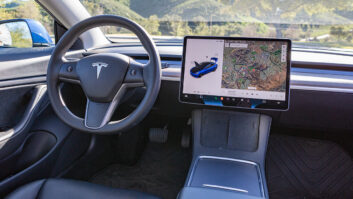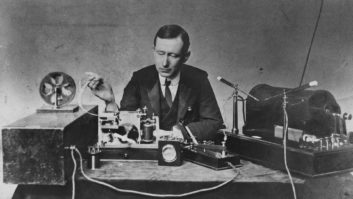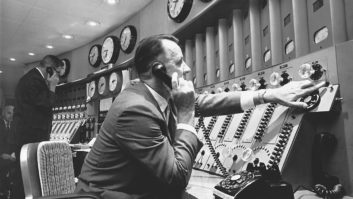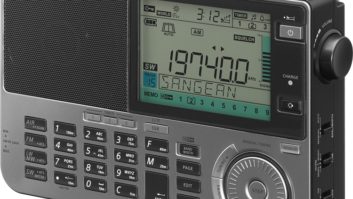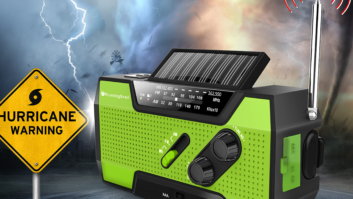The author is president/CEO of World Christian Broadcasting. These are his remarks about shortwave broadcasting to the recent HFCC B11 Conference in Dallas. HFCC manages global databases of international shortwave and is part of the International Telecommunication Union.
It is a great pleasure and an honor to greet each of you on behalf of World Christian Broadcasting and our international station KNLS, Anchor Point, Alaska. Soon, shortly after the beginning of 2012, we will be able to greet you on behalf of Madagascar World Voice, our new station on the island of Madagascar. I also bring you greetings from Kevin Chambers, our director of engineering and Andy Baker, our vice president of development. They are here today.

Charles Caudill
That new station and the some $11 million we are spending on expansion is the reason I have been asked to speak to you today. On numerous occasions, I and others of our management team have been asked, “Why are you expanding your use of shortwave when most everyone else is cutting back by reducing the number of languages they broadcast, thereby reducing the number of people they employ and thus reducing their budgets by numbers like $14 million and even $40 million each year?”
That is a great question and one that we have given much consideration.
We are a non-profit corporation. One hundred percent of our income is derived from donations. Obviously, we must act wisely and be excellent stewards of the funds we receive or those funds will stop coming. Believe me, our donors are well aware of the changes that are occurring in the shortwave community, so we have found it necessary to communicate those decisions clearly and truthfully.
Here is at least a part of our thinking process as we have made our decision to expand our shortwave capabilities and our determination that the future of shortwave broadcasting is bright!
More listeners than ever
The Mission Statement for World Christian Broadcasting states that WCB exists so that people in places best served by broadcast media become aware of the Good News of Jesus Christ and want to hear more. Quite frankly, we can think of no way to better accomplish that than through shortwave broadcasts.
Since July 23, 1983, for more than 28 years, we have used that tried-and-true method to reach our listeners with that message of hope. It appears we have more listeners today than ever before.
We feel our content, our message, is key to retaining those listeners. We use a magazine format. We talk about the news, current events, sports, health, medicine and spiritual things. We draw the line, however, in trying to tell our listeners what to do. They must make their own decisions as to what they should do or what risks they should take. It is they, after all, who must live with the consequences of their actions.
During those 28 years we have learned that building relationships with our listeners is not an easy thing. Finding listeners is hard. Keeping them is hard. Our efforts are all about listener engagement — the making of personal, finely cultivated relationships that are as satisfying for our listeners as they for us.
Gone are the days when broadcasters could just shine the spotlight on themselves and expect the listener to accept whatever may be said. That lazy, ineffectual approach of talking to listeners is so over that we need a new word for just how over it is.
Our goal is to make friends with each individual listener. Relationships with listeners are very much like those with friends and family members. Neglect, arrogance, abuse and other negatives are damaging. Respect, nurturing and communication are beneficial. It pays to be honest, to be genuine, to be vulnerable and to be the best we can possibly be.
As with all relationships, it takes time, it’s a little scary, but it is definitely worth the extra effort to let our listeners know we honestly care about them, their family and their future. We at World Christian Broadcasting try to never forget that there may be another broadcaster out there with a similar mission whose programming staff also has a deep dedication to engagement. And we know they’ll be more than happy to give our listeners what they need and deserve. The message is key. Even one soul is worth the effort.
Budget reality
Another reason we have opted for shortwave for our future is that our budget is limited.
In order to make that budget go as far as possible, there is no question that we can reach more people on a regular basis with shortwave than with any other method. With an annual budget of something over $3 million, we will be able to broadcast 50 to 60 hours daily from our two broadcast facilities. Those 50 to 60 hours will be produced by six different services: English, Russian, Chinese, Arabic, Latin American and African.
Obviously, we cannot do everything on that limited budget, but we can literally talk to millions of people using shortwave. We don’t have the luxury of being able to cut $40 million or even $14 million from our budget as some international broadcasters can. Our idea is that God has given us the ionosphere. Our job is to make use of it.
There are millions of analog receivers in the world — some say 600 million, some say 1.5 billion, some say as many as three billion. Regardless of the number, those receivers will not be turned off tomorrow. Those receivers will have listeners for years and years.
Look around; even though technology advances with great rapidity, there are still newspapers. I receive mine every morning. There are still AM radios and FM receivers and they are still making more. And you can still buy books. They are still being published. Even though Amazon is making a fortune selling electronic digital reading devices, they still sell books.

The transmitter building of the Madagascar World Voice facility, with a generator building at left. In the background are three of the four towers and MWV’s three antennas.
My point is, no medium disappears overnight. Our belief is that shortwave will be here for a long, long time.
Sure, we use other media and will continue to use the Internet and social media. After all, we do own the words, so as long as we can afford it we will continue to send our messages out in any way possible — but, our future is shortwave.
Net access
Our job is to “take the Gospel into all the world.” Unfortunately, relatively few people in some parts of the world have access to the Internet.
Let me give you an example. Only 1 percent of the people of Madagascar have access to Internet. Kevin Chambers and his wife Nancy live there most of the year. They are not only familiar with the lack of internet accessibility, they are also aware that most of that access is not reliable enough to listen to a broadcast. Interestingly, most of those people who do use the Internet in Madagascar use an Internet café.
Another example would be the much larger population of China. A recent report stated that two-thirds of the people of China do not have Internet access and it is a fact many of those who do — go to Internet cafes for communication. It is our belief that folks using an Internet café will not spend their money to listen to a religious message.
Sure, there is a very large group of people in China who can afford the computers necessary to be involved with the internet. There are literally millions. But the fact remains that there are many more millions who cannot make that purchase — just as there are millions in the United States or any country who can’t afford that kind of purchase.
The best way to reach those folks is with shortwave broadcasts. We simply don’t want to miss the potential audience of some 870 million Chinese listeners who don’t have access to internet.
A similar problem occurs when we would like to send out messages via satellite. Millions and millions do not have satellite receivers. Someone recently made a presentation to our Russian Service. They wanted our Russian programs and they wanted us to pay to broadcast them via satellite. Just a little research revealed we would have very few listeners because of the price of the phones and other receivers that are available in Russia.
Interestingly, there are still many broadcasters using shortwave to reach the Russian people. I went on the Internet last week and found that for the B-10 season there are 6,500 hours each week being sent throughout Russia in the Russian language. Forty percent of that total is being sent out by the Voice of Russia and Radio Mayak. The Russian broadcasters know that if you want to reach the more remote areas of Russia, you must use shortwave.
Even though many technology changes have occurred in Russia since Perestroika, most of those changes have occurred in the large metropolitan centers, especially Moscow and St. Petersburg. Of course, we want to reach those areas, but we also want to reach Siberia — shortwave is the only way. There is little or no Internet or cell phone capability in Siberia.
Smart phones
What about the use of smart phones? Many have applications that can receive satellite broadcasts.
During 2009, 2.2 million cell phones were sold in Russia. In 2010 that increased to 4.3 million. Nearly all of those are in St. Petersburg and Moscow. Estimating that there may be as many as 10 million to 12 million cell phones in Russia, it would not be feasible for us to spend the money to buy time on a satellite. By the way, the average smart phone in Russia in 2010 cost $500. For 2011 they have decreased in price to $400. Not many of us would want to spend that kind of money.
There is no indication that the Russian government will be willing to spend the money necessary to build an infrastructure of fiber optics that will allow the east and far eastern parts of Russia to catch up with St. Petersburg and Moscow. Shortwave will remain the primary means of communicating with the remote areas of Russia — by the Russians and by World Christian Broadcasting.
Access
Very clearly, there is another aspect of communicating with our listeners that we must consider. In some countries there are gatekeepers — governments that do not want their citizens to hear certain messages. It is much less difficult and less expensive to block Internet messages than shortwave messages. In fact, there are no cheap ways to jam shortwave. There will always be a fear in some countries as to who is watching and listening to any kind of communication, but fortunately, shortwave listening is very private. The last thing I want to mention as being the reason we will continue to use shortwave is DRM.
We have bought into the DRM philosophy and technology. Our transmitters are digital-ready. If there were sufficient numbers of receivers out there, we would begin our broadcasts from Madagascar in digital rather than analog. We believe that when it becomes possible for inexpensive DRM receivers to be available worldwide, shortwave broadcasts will increase in number, just as the quality of the reception improves.
We believe there will be commercial opportunities available that are not apparent with our analog broadcasts. We certainly feel we will be able to sell time to program producers, who want to get a quality-sounding message around the world. We are anxious for that day to come.
I am sure I have not given you any new ideas. I am just as sure that those of you who are decreasing the number of hours you send out via shortwave have considered the same things we considered and I have mentioned. We simply have come to different conclusions.
Nevertheless, we are quite confident in our decisions and let me leave you with this: Our special thanks to those who are decreasing your shortwave hours — you have just left a larger audience for World Christian Broadcasting.
The above text is courtesy of the National Association of Shortwave Broadcasters.





